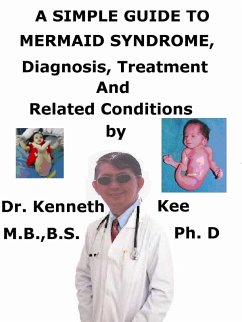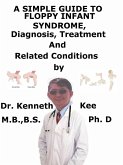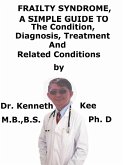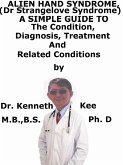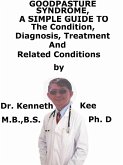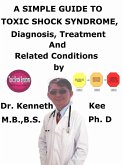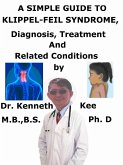Mermaid syndrome, or sirenomelia, is a genetic disorder that causes a baby to be born with fused limbs, which may resemble a mermaid's tail.
The disorder is very rare, with only 300 reports of this disorder happening in the world and is often fatal.
Mermaid syndrome is a serious disorder in which a baby's legs are completely or partially fused from birth.
It is often fatal early in life.
Male babies have this disorder three times more often than females.
Mermaid syndrome has been categorized into three types, depending on the number of bones in the lower part of the body:
Sirenomelia apus- absent feet, one tibia, one femur
Sirenomelia unipus- one foot, two femurs, two tibia, two fibula
Sirenomelia dipus- two feet and two legs with all the bones fused together
Sirenomelia is a severe type of caudal regression syndrome, a term for disorders that involve disorders forming the lower part of the spine.
Doctors do not know exactly the precise cause of mermaid syndrome and caudal regression syndrome, but they believe it is probably a combination of environmental and genetic factors
Doctors report many cases as sporadic, meaning they happen for no known reason.
These causes often result in impaired blood flow in the embryo, particularly in the region where the lower limbs would normally grow.
Some possible environmental causes of mermaid syndrome and other caudal regression syndrome types are:
Alcohol use
Amino acid imbalances
Lack of oxygen in the uterus
Exposure to toxins, such as those in cigarettes, lithium, and cocaine
Exposure to retinoic acid
Doctors also link differences in a specific gene called VANGL1 with a higher risk for mermaid syndrome.
They do not know exactly why a mutation in this gene produces caudal regression syndrome.
Risk factors
Possible risk factors for mermaid syndrome are:
The biological mother having diabetes, which is the case for 22% of fetuses with this disorder (it may be that good blood glucose control in the mother can reduce the risk)
Exposure to teratogens, which are substances that elevate the chances of birth abnormalities
The mother being younger than 20 years
Genetic factors
Being male, as the disorder is 2.7 times more likely to affect males than females
Being an identical twin of the 300 examples of mermaid syndrome that medical journals have reported, 15% are twins mostly identical
A major risk factor identified is maternal diabetes.
An evaluated 22 % of fetuses with mermaid syndrome are born to women with maternal diabetes.
The most discerning feature of mermaid syndrome is the baby's legs that are either partly or completely fused together.
Babies born with mermaid syndrome also are likely to have other anomalies that affect their abilities to survive outside the womb:
Absent tailbone
Anal atresia
Foot anomalies that are the absence of feet or feet rotated outward
Gastrointestinal abnormalities
Heart malformations
Partly or completely missing sacrum
Spina bifida
Underdeveloped or absent kidneys
Underdeveloped lungs
Doctors will normally be able to diagnose mermaid syndrome by ultrasound during pregnancy.
The doctor may recognize the abnormalities linked with mermaid syndrome, particularly the fused lower limbs.
The treatment for a baby with mermaid syndrome normally requires consulting multiple specialists.
Even with treatment, mermaid syndrome is normally fatal past the newborn period.
TABLE OF CONTENT
Introduction
Chapter 1 Mermaid Syndrome
Chapter 2 Cause
Chapter 3 Symptoms
Chapter 4 Diagnosis
Chapter 5 Treatment
Chapter 6 Prognosis
Chapter 7 Klippel-Feil Syn...
Dieser Download kann aus rechtlichen Gründen nur mit Rechnungsadresse in A, B, CY, CZ, D, DK, EW, E, FIN, F, GR, H, IRL, I, LT, L, LR, M, NL, PL, P, R, S, SLO, SK ausgeliefert werden.

